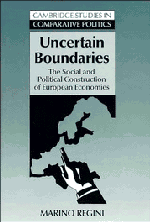Book contents
- Frontmatter
- Contents
- Preface
- Acknowledgements
- Introduction: the shifting boundaries between market, politics and society
- PART I THE RISE AND DECLINE OF THE POLITICAL REGULATION OF THE ECONOMY
- PART II THE MICRO-SOCIAL REGULATION OF ECONOMIC ADJUSTMENT
- Conclusion: the uncertain boundaries between macro and micro – the production of collective goods in the European economies
- Notes
- References
- Index
Conclusion: the uncertain boundaries between macro and micro – the production of collective goods in the European economies
Published online by Cambridge University Press: 26 May 2010
- Frontmatter
- Contents
- Preface
- Acknowledgements
- Introduction: the shifting boundaries between market, politics and society
- PART I THE RISE AND DECLINE OF THE POLITICAL REGULATION OF THE ECONOMY
- PART II THE MICRO-SOCIAL REGULATION OF ECONOMIC ADJUSTMENT
- Conclusion: the uncertain boundaries between macro and micro – the production of collective goods in the European economies
- Notes
- References
- Index
Summary
The model the centralized and concerted political regulation of the economy discussed in Part I based its legitmacy and attraction on two presupposition: (1) if left to itself, the market it able to ensure neither the production of socially desirable goods (such as full employment or income security) nor the production of ‘collective goods’ (Olson 1965) for its principal actors, that is, firms (goods such as the containment of inflation, the development of human resources and social peace); (2) consequently, these goods should be the object of policies elaborated centrally by public institutions acting in accord with large interest organizations. The first of these assumptions has rarely been contradicted over the half century since the end of the Second World War during which we have seen the rise and decline of this model of regulation in the European economies. By contrast, the evident difficulties, limitations and contradictions of the second assumption have bred doubts among scholars and political actors alike.
Reactions to these difficulties have ranged from a revival of the ideology of the unregulated market, on the one hand, to repeatedly frustrated attempts to render public intervention more efficient, on the other. Only rarely has consideration been given to the hypothesis that the production of collective goods might be, under certain conditions, the outcome of processes different not only from the workings of the market but from intervention by public institutions and interest organizations at the central level – intervention deliberately designed to achieve this goal and which seemed the only possible alternative to the free market.
- Type
- Chapter
- Information
- Uncertain BoundariesThe Social and Political Construction of European Economies, pp. 127 - 145Publisher: Cambridge University PressPrint publication year: 1995



